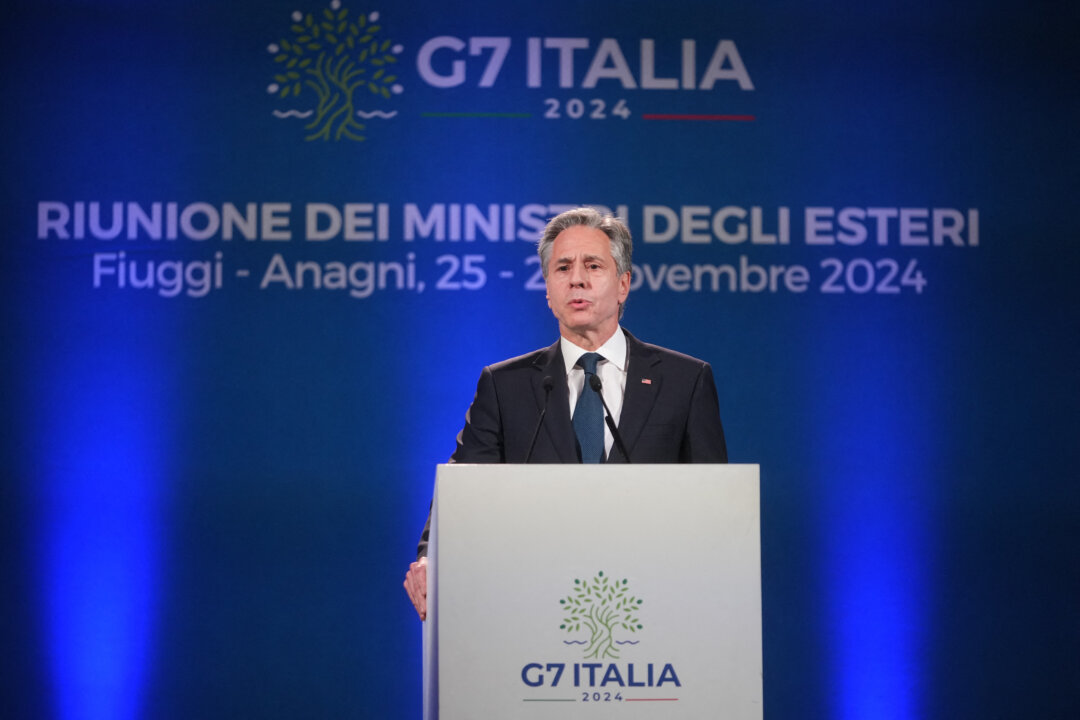‘We’re now engaging China and the challenges it poses from a position of strength,’ the secretary of state said.
The Group of Seven (G7) countries are “increasingly aligned” in their efforts to confront economic and security risks posed by communist China, Secretary of State Antony Blinken said on Nov. 26, after the group’s foreign ministers ended their two-day meeting in Italy.
“The bottom line is this: We are much stronger, we’re much more effective, when we’re acting together, not alone,” Blinken said at a press conference in Fiuggi, Italy. “And just to cite the obvious example in the economic area when we’re dealing with policies of concern by China, any of our countries acting alone compared to when we’re acting together simply cannot be as effective.”
The G7 is a group of the world’s most advanced economies, comprising Canada, France, Germany, Japan, Italy, the UK, and the United States, with the European Union participating as an observer.
The event marks the last G7 meeting of President Joe Biden’s presidency. President-elect Donald Trump has nominated Sen. Marco Rubio (R-Fla.), a longtime China hawk, for secretary of state.
“In the case of the United States, we’re 20 percent or so of world GDP. When we’re acting together with our G7 partners, it’s more like 50 percent, and that weight is a weight that can’t be ignored,” Blinken said.
“As a result of the historic investments that we’ve made at home in the United States as well as in our partnerships abroad, we’re now engaging China and the challenges it poses from a position of strength, and that’s something that we’ll be able to hand off to the next administration.”
China
The foreign ministers issued a joint statement after their meeting, saying they “are deeply concerned by China’s increasing support” to Russia’s defense industrial base that “is decisively enabling Russia to maintain its illegal war in Ukraine.”
Other concerns related to China included the communist regime’s non-market practices, the dangerous deployment of Chinese coast guard and maritime militia in the South China Sea, the human rights violations in Xinjiang and Tibet, and the recent sentencing of 45 pro-democracy activists in Hong Kong.
The group reiterated its support for peace and stability across the Taiwan Strait and Taiwan’s “meaningful participation” in international organizations.
Tension is high between Beijing and Taipei, where the Chinese regime has been targeting Taiwan with “grey zone” operations, such as flying military aircraft or balloons into the island’s air defense identification zones.
In a statement issued on Nov. 27, Taiwan’s foreign ministry welcomed the G7 alliance’s support. It said the island will continue to work with G7 member states to safeguard democracy, freedom, human rights, and the rule of law.
The Canadian province of Alberta will be the site of the next G7 Leaders’ Summit in 2025.
Partnerships
It remains to be seen how Trump will engage allies and partners in the Indo-Pacific. Experts expect Trump to escalate deterrence against the Chinese regime’s aggression during his second term, tackling issues such as the country’s overcapacity.
Yuki Tatsumi, senior fellow and co-director of the East Asia Program and director of the Japan Program at the Washington-based think tank Stimson Center, said that if Trump carries out his “America First” agenda properly, he could “incentive U.S. allies and partners to forge closer coalition among themselves,” according to a policy memo published on Nov. 26.
Tatsumi offered several policy recommendations to the incoming Trump administration, including the importance of explaining clearly to U.S. allies how Washington values “equitable alliance and partnership” and encouraging U.S. partners to deepen their existing ties. She also advised against putting allies in a position where they need to choose between China and the United States.
“A robust cooperation between Japan and the Philippines can serve critical at a time when China’s behavior in the South China Sea requires greater attention,” Tatsumi wrote.
Joris Teer, an associate analyst at the European Union Institute for Security Studies, published a commentary article on Nov. 21, saying that the EU should work proactively with the Trump administration to enhance industrial capacity.
“The EU, US, and partners can kickstart reindustrialisation by aligning public procurement clauses to promote production of critical components and materials outside of China and Russia,” Teer wrote, suggesting that the transatlantic allies could reach an industrial pact on the issue.
“If EU and other allied leaders fail to initiate a deal, Washington will again march onward unilaterally, de-prioritising the economic and security interests of allies.”

